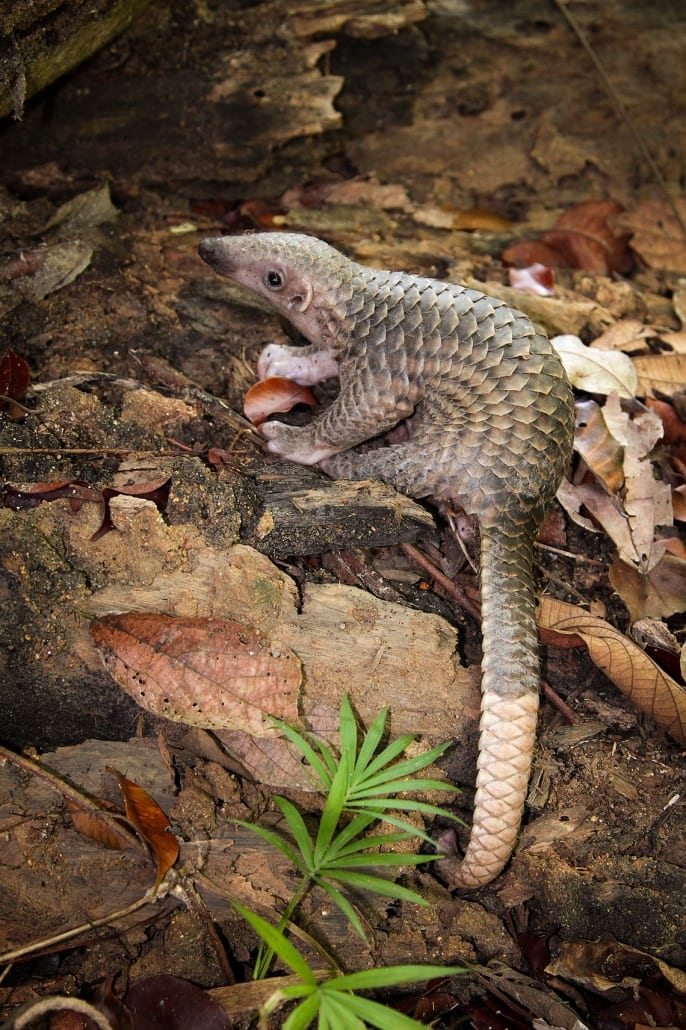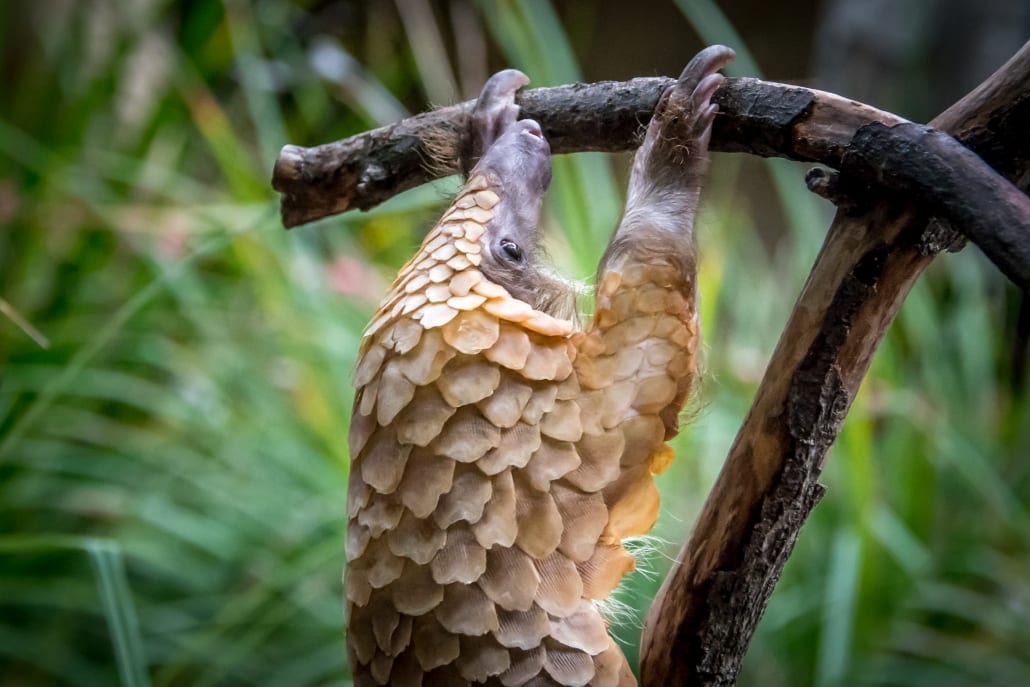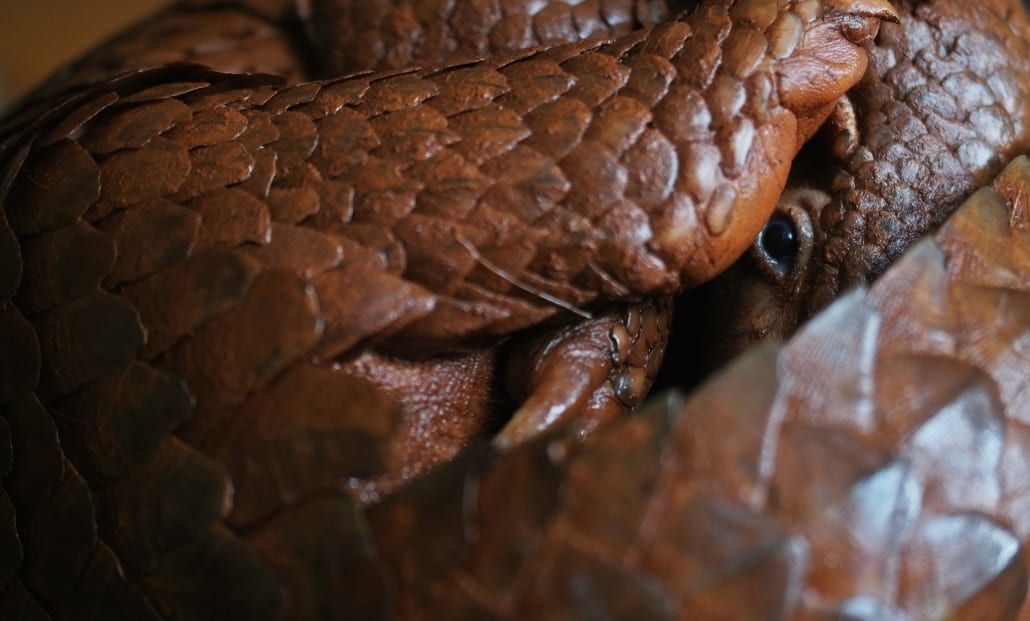The Most Trafficked, Least Known Animal: Celebrating World Pangolin Day on February 16
By Alex Antram
An animal that does not follow the physiological rules of its fellow mammals roams the rainforest, known to conservationists but likely unfamiliar to you. Somehow, the pangolin has the distinction of being both the least known and most trafficked animal in the world. There are eight species, four in Asia and four in Africa. IUCN lists the four Asian species — the Chinese, Indian, Philippine and Sunda — as either Endangered or Critically Endangered. All four African species — the Black-bellied, Giant Ground, Temminck’s Ground and White-bellied — are Vulnerable.
Pangolin conservationists describe them as shyly charismatic. And pangolins definitely need organizations like Rainforest Trust to protect their habitat from human encroachment. But hunting for their meat and scales is the real danger.

The Critically Endangered Sunda Pangolin. Photo by Zaharil Dzulkafly.

The Vulnerable White-bellied Pangolin. Photo by Helene Hoffman.

An Endangered Philippine Pangolin curled into a protective ball. Photo by John Christian S. Yayen.

Pangolin scales confiscated by the Government of Cameroon in 2017, before being burned on World Pangolin in an effort to show the public that poaching in the country will not be tolerated. Photo by Kenneth Cameron – USFWS.
Yes, scales. Pangolins are the only mammal with body armor built from the same keratin that makes our fingernails. Some refer to pangolins as scaly anteaters, because of their pronounced snouts and penchant for ants.
They almost resemble walking artichokes with short legs and claws that couldn’t threaten anything other than a termite mound. The scales are part of their defense response; pangolins rarely run from danger, instead curling into tight, impenetrable balls when threatened. But they can’t curl up to protect themselves from humans. Indeed, that armor is what makes them attractive to poachers.
Pangolin scales have medicinal value in traditional Chinese medicine. Once dried and ingested, the scales are believed to cure everything from malaria to deafness to nervousness in children.
Hunting and processing pangolins for scales is a centuries old tradition alive and well. In fact, Hong Kong customs seized 8,300 kilograms (18,300 pounds) of scales the first weekend in February. That haul would have required poaching about 14,000 individual pangolins. But scales sell at $600 a kilogram, so that amount could bring a trader upwards of $5 million. A 2017 article estimates that 2.7 million pangolins are poached annually in Africa alone, with meat and scales trafficked to Asia.
As an anthropologist, I believe in the value of cultural traditions. But I worry when materials used in a localized practice transform into commodities in the global marketplace, especially those banned by the Convention on International Trade in Endangered Species. The scales seized in Hong Kong were from Nigeria, home of two Vulnerable pangolin species. And these aren’t species that have numerous offspring in quick succession and therefore rapidly repopulate. African pangolins gestate for five months and usually birth just one pup. They can’t breed fast enough. This global commodification of pangolins is unsustainable and their absence from the rainforest has unknown ecological ramifications.
Pangolins live in 24 of Rainforest Trust’s project sites across Asia and Africa, including protected areas in the Democratic Republic of Congo, Cameroon, Ghana, Indonesia, Vietnam and the Philippines. In honor of World Pangolin Day on February 16, Rainforest Trust is seeking support for the Critically Endangered Chinese Pangolin in Nepal’s Rhododendron Forests. Protecting pangolins’ habitat and supporting anti-poaching patrols through funding Rainforest Trust forest guardians is the best way to ensure a future for these unusual, charismatic creatures. With your help, we can save them.
Thanks to the generous support of our Board members and other supporters who cover all of our operating expenses, Rainforest Trust is able to allocate 100% of donations to conservation action. No board member receives financial benefit and our staff salaries are modest.
Rainforest Trust is a registered 501(c)(3) nonprofit organization.
Quicklinks
Headquarters
To Visit Us:
7200 Lineweaver Road
Suite 100
Vint Hill, VA 20187
For Mailings:
P.O. Box 841
Warrenton, VA 20188
To Call Us:
(800) 456-4930
EIN: 13-3500609
CFC #11257



